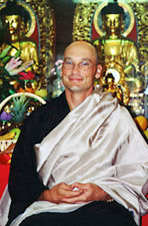Home » Literature Archives » Chasing Enlightenment
CHASING ENLIGHTENMENT
by Da Shi Yin Zhao
Aesop, that wise old story teller of ancient Greece, lived a hundred years before the Buddha and a thousand years before Bodhidharma. But he didn't have to study the Eightfold Path or Zen.
Wisdom is wisdom no matter where we find it; and with or without Right Effort, Aesop found it.
One day a hound, out hunting alone, flushed a hare from a thicket and gave chase. The frightened hare gave the dog a long run and then escaped. The hound was disappointed, but he held his head up as he trotted home. His attitude irritated a passing shepherd. "You're supposed to be such a fine hunter, " he sneered. "And you couldn't even run down a hare that's a fraction of your size."
"You forget," replied the hound, "that I was only running for my supper. The hare was running for his life."
Whether hare, hound, or human being, motivation is everything. What is the goal... and how badly do we want it? The rabbit wanted to live more than the hound wanted to eat. He tried harder.
The importance a person attaches to a goal changes the amount of effort he puts into attaining it. As a beginner, a person can approach Zen either as the hound or as the hare. If a beginner sees Zen as merely a method for coping with life, he is like the hound. Zen is simply a meal, the convenient "flavor of the month." If he decides he doesn't like it as much as he expected, he can easily replace it with another method. If the beginner approaches Zen as a method of salvation, he is like the hare. The approach is one of complete effort, because he realizes his life depends upon the outcome.
When I first approached Zen I was like the hound. I thought Zen would give me a relaxed stance. I wanted to be poised... balanced... so that I could better cope with the stress and emptiness I was feeling. My approach to meditation was simple: if I didn't get immediate results, I'd give up. I'd just move on to a different method - until I became dissatisfied with it, too. I went through a dozen different approaches, and with each one I had the same attitude: "Well, if this doesn't work, there's always something else." It hadn't occurred to me that Zen wasn't merely a technique.
I thought that I could use it as I'd use a tool for fixing a problem, something that I could pick up or put down or replace, whatever suited my needs. I wanted to be able to practice Zen and still keep my egotistical life intact. What I really wanted was to give myself that calm demeanor, that poise that conveyed the impression that I was a cool and well-grounded Man of Zen. The appearance would help me to win promotions at work, to make more money and be admired and respected. In the back of my mind, I was like the hound, using a particular kind of strategy to catch the rabbit. If I didn't "catch it with Zen," I could try something else.
After taking the Precepts, I continued to approach Zen as the hound. I dabbled in different meditation techniques for the next couple of years, without really settling down to one method. Of course, during this period, I always felt that there was something wrong with the technique. The problem couldn't possibly be with me or my lack of effort.
Then came the turning point in my life. I was in the Air Force and I received an assignment to South Korea. I had to leave my family behind and live in Korea for a year. I was required to live by myself in a small, plain barracks room. For the first month or so, everything was fine. My job kept me busy and I wrote and phoned home regularly. But then the loneliness hit. I would sit in my room during the weekends with absolutely nothing to do but feel miserable and isolated - as if I was alone and abandoned on another planet, looking back at the blue earth from far away in space. I wasn't the hound any more.
One day, with tears in my eyes, I sat on my pillow and prayed. I knew at that point that I couldn't cope with the world without the Buddha's help. I also realized that I had to help myself by approaching Zen with an honest effort, with a Right Effort, that in all ways I had to "live out the life of the Buddha Self."
I picked a meditation method, worked hard to get the method right, and stuck with it. I changed my attitudes towards the material world. I began to see what was important and what wasn't. So, finally, I began to approach Zen as the hare being chased by the hound; I approached Zen knowing that my life depended on it.
With my new attitude my meditation practice quickly improved and deepened. I don't know how the rabbit felt when he safely "got to earth" but he couldn't have been more euphoric than I was after each of my meditation sessions. I pushed on and, using Right Effort, I achieved Samadhi within a few more months.
The Buddha spoke of Right Effort. He wisely pointed out that we are all subject to bitterness and pain and to decay; and he advised us to "seek our salvation with diligence." The clock is ticking. The countdown is underway.
If you're like the hound and see Zen as "just another meal among many," you'll lack motivation and you'll give up too easily.
If you're like the hare and see Zen as your deliverance, your salvation, you'll stick with it until you're safe in Amitabha's hands.

